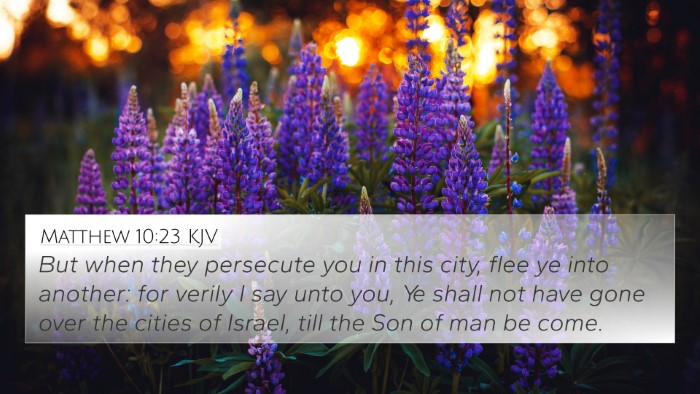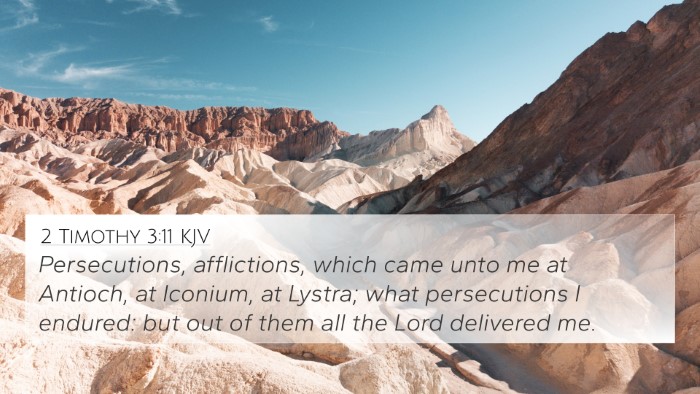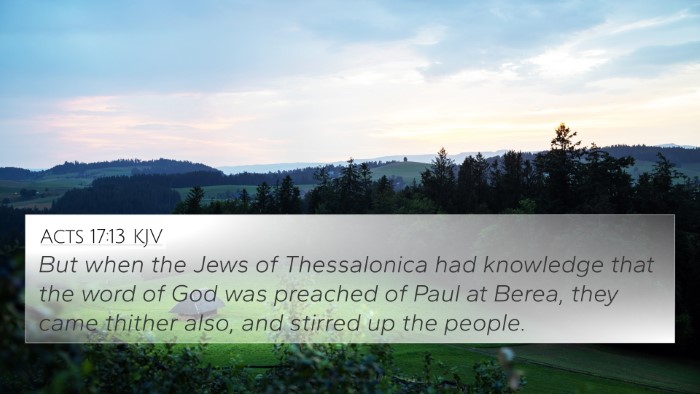Understanding Acts 14:6
Acts 14:6 states, "They were aware of it and fled to Lystra and Derbe, cities of Lycaonia, and to the surrounding region;" This verse illustrates the perseverance of the Apostles, particularly Paul and Barnabas, and their commitment to spreading the Gospel despite the threat to their lives. Below, we explore the meanings and implications of this verse as drawn from various public domain commentaries.
Summary of Acts 14:6
This verse occurs during Paul's first missionary journey, specifically after the Apostles had faced hostility in Iconium. The decision to flee highlights both human wisdom and divine guidance in the Apostles' mission. While they continued their work for the Lord, they were also aware of the dangers posed by opposition.
Commentary Insights
-
Matthew Henry:
According to Henry, this flight demonstrates the balance between boldness in faith and the practicality of self-preservation. Paul and Barnabas were fearless in declaring the Gospel, but they recognized when to withdraw for the sake of continuing their ministry elsewhere. They did this not out of fear alone but in wisdom to maximize their effectiveness as messengers of Christ.
-
Albert Barnes:
Barnes emphasizes the significance of the cities Lystra and Derbe. He notes that these places were largely populated by Gentiles, presenting an opportunity for the Gospel to expand beyond Jewish audiences. The Apostles’ confrontation with danger led them to areas where they would encounter both receptivity and further challenges in their mission.
-
Adam Clarke:
Clarke highlights the urgency of their escape, pointing out that the Apostles were aware of the growing hostility. Their flight did not signify cowardice; rather, it exemplified strategic movement in missionary work. Clarke encourages readers to appreciate the boldness of the Apostles, who were willing to confront peril in pursuit of their mission.
Related Bible Cross-References
Acts 14:6 can be linked with several other scriptures that illustrate similar themes of persecution, mission, and divine guidance:
- Matthew 10:23: "But when they persecute you in this city, flee to another." This verse parallels the actions of Paul and Barnabas, emphasizing the necessity of retreat in the face of danger to continue the mission elsewhere.
- 1 Corinthians 9:19-23: Paul speaks of adaptability in ministry for the sake of the Gospel, mirroring their strategic decisions throughout their journey.
- Acts 13:50: Here, the opposition in Antioch compels Paul and Barnabas to move on, highlighting the continual theme of facing persecution.
- 2 Timothy 3:11: Paul references the persecutions he endured, connecting personal experiences as part of the missionary journey.
- Philippians 1:14: Paul mentions how his imprisonment has encouraged others to speak the Word of God more boldly, reflecting the fruit of trials in ministry effectiveness.
- Romans 8:31: "If God is for us, who can be against us?" This verse emphasizes the courage inspired by faith while facing persecution.
- Acts 8:1: A situation where persecution leads to the scattering of the disciples, which ultimately spreads the Gospel further, similar to Paul and Barnabas' experience.
Thematic Connections
The thematic connections present in Acts 14:6 not only outline the physical realities of the Apostles' journey but also speak to the underlying principles of faith, movement, and divine revelation. By analyzing such passages in conjunction, readers can develop a comprehensive understanding of how early Christians navigated fear and challenges for the sake of spreading the Gospel.
Cross-Referencing Tools
Utilizing tools like a Bible concordance or a cross-reference Bible study guide, individuals can dive deeper into the rich tapestry of Biblical interconnectedness. These resources help in understanding how different verses relate to each other thematically, encouraging a robust study of God’s word.
Conclusion
Acts 14:6 reveals profound lessons about wisdom in ministry and the resilience of the Apostolic mission. Through careful cross-referencing and thematic connections, one can appreciate the trials faced by the early church and the strategic actions taken to ensure the Gospel's spread. By exploring these connections, believers gain insights into the importance of scriptural context and inter-Biblical dialogue.










